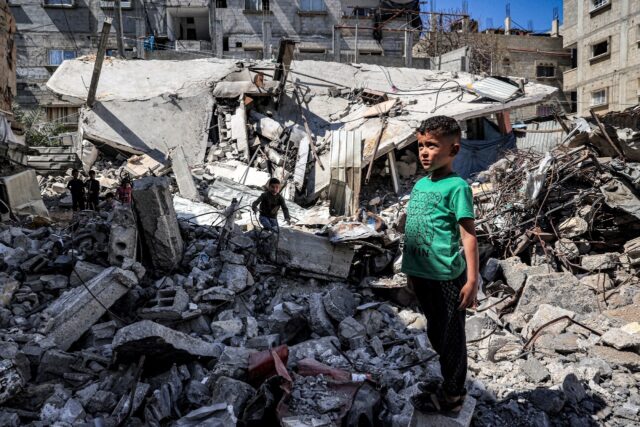US President Joe Biden issued some of his sternest criticism yet of Israel’s war on Hamas, calling its approach a “mistake” as the country faces a Wednesday court deadline to prove it is not throttling aid to hunger-stricken Gaza.
With global outrage over the toll inflicted by the six-month-old war growing, Biden rebuked Israeli Prime Minister Benjamin Netanyahu’s handling of the conflict and reiterated the need for a ceasefire.
“I think what he’s doing is a mistake. I don’t agree with his approach,” Biden told Spanish-language TV network Univision in an interview that aired Tuesday night.
He urged Netanyahu “to just call for a ceasefire, allow for the next six, eight weeks, total access to all food and medicine going into the country”, in remarks that underscored the dramatic shift in tone from Israel’s main ally and military backer.
Biden’s comments come as US, Qatari and Egyptian mediators seek progress on a truce and hostage release deal that also proposes ramping up aid deliveries to address a worsening hunger crisis in the Gaza Strip.
Israel insists it is not limiting aid and has complied with US and United Nations demands to scale up the deliveries.
The government faces a Wednesday deadline from the country’s Supreme Court to demonstrate it has taken steps to increase the flow of humanitarian goods.
The case was brought by five NGOs that accuse Israel of restricting the entry of relief items and failing to provide basic necessities to Gazans.
The UN’s agency for Palestinian refugees, UNRWA, said Tuesday that following reports of imminent famine, more than 40 percent of food delivery missions were denied in February and March. None of the UNRWA food convoys have been approved since March, it added.
Humanitarians have accused Israel of using starvation as a method of war in Gaza, where UN experts say 1.1 million people — half the population — are experiencing “catastrophic” food insecurity.
The Israeli agency that oversees supplies into the territory, COGAT, said 741 aid trucks had crossed into Gaza on Sunday and Monday, with another 468 entering on Tuesday.
Before the October 7 start of the war, about 500 trucks supplied Gaza daily.
Samantha Power, administrator of the US Agency for International Development (USAID), said recent days have seen a “sea change” in deliveries to Gaza, but added that Israel needs to do more.
“We have famine-like conditions in Gaza and supermarkets filled with food within a few kilometres away,” she told US lawmakers during a Tuesday hearing.
‘Less than encouraging’
The White House has said Israel has taken “some steps forward” in securing a truce, while Hamas’s response has been “less than encouraging”.
Under the latest proposal, fighting would stop for six weeks, about 40 women and child hostages in Gaza would be exchanged for hundreds of Palestinian prisoners held by Israel, and up to 500 aid trucks would enter Gaza per day, according to a Hamas source.
Hamas leader Ismail Haniyeh has accused Israel of failing to respond to demands for an end to the war, while Netanyahu maintains Israel must achieve the twin goals of bringing home “all our hostages” and eliminating militants from the strip.
Finding himself increasingly internationally isolated over the bloodiest-ever Gaza war, Netanyahu on Tuesday told military recruits that “no force in the world” would stop Israeli troops from entering the southern Gazan city of Rafah.
“We will complete the elimination of Hamas’s battalions, including in Rafah,” he said, after earlier declaring a date for the operation had been set.
Speaking to reporters Tuesday, US Secretary of State Antony Blinken said he had no indication of an “imminent” assault on the city, the last in Gaza to be the target of a ground invasion and where around 1.5 million Palestinians are sheltering.
Blinken added that he doubted Israel would attack Rafah before next week, when a delegation is set to visit Washington.
US officials have repeatedly aired objections to such an attack, including during Biden’s call last week with Netanyahu.
“A full-scale military invasion of Rafah would have an enormously harmful effect” on civilians trapped there and “would ultimately hurt Israel’s security”, said US State Department spokesman Matthew Miller.
Israel has invited tenders for 40,000 large tents, according to a document on the defence ministry website -– part of its preparations to evacuate Rafah ahead of an offensive, a government source told AFP on condition of anonymity.
‘Moral failure’
The war broke out with Hamas’s October 7 attack against Israel, which resulted in the deaths of 1,170 people, mostly civilians, according to Israeli figures.
Palestinian militants also took more than 250 hostages, 129 of whom remain in Gaza, including 34 the Israeli army says are dead.
Israel’s retaliatory offensive has killed at least 33,360 people in Gaza, mostly women and children, according to the Hamas-run territory’s health ministry.
The carnage wrought by the war was on full display at the destroyed Al-Shifa Hospital in Gaza City, where relief teams and relatives have been scouring for human remains among piles of concrete and twisted rebar.
Health workers in white hazmat suits wandered between bombed-out buildings as diggers plied mounds of rubble.
“The stench of death is everywhere,” said Motasem Salah, director of the Gaza Emergency Operations Centre.
The World Health Organisation said Israel’s two-week raid had transformed Gaza’s largest medical complex into a ruin.
“When the dead are buried properly, they can be identified later with forensic examinations, giving loved ones some consolation,” WHO chief Tedros Adhanom Ghebreyesus posted on social media on Tuesday. “This war is a moral failure of humanity.”

COMMENTS
Please let us know if you're having issues with commenting.